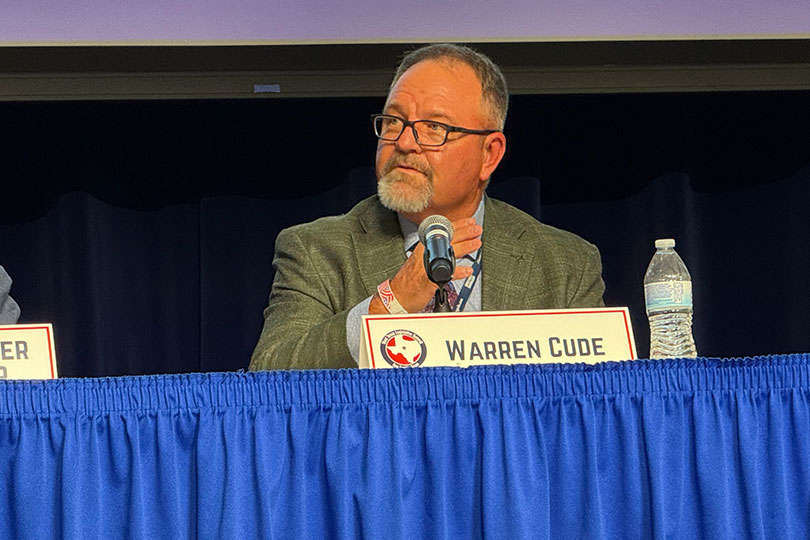By Shelby Shank
Field Editor
Agriculture was on the agenda at this year’s West Texas Legislative Summit, an annual event focused on the challenges and opportunities shaping the region’s future.
“Agriculture is a major economic driver in West Texas, and this event gave us an opportunity to talk about several issues and their impact on agriculture in Texas and the U.S.,” said Warren Cude, Texas Farm Bureau District 6 state director.
One of the biggest concerns discussed was the New World screwworm threat to livestock.
The screwworm is less than 400 miles from the U.S.-Mexico border, and the only proven way to eradicate the pest is using the sterile insect technique. An important component of that technique would be a domestic production facility to produce and disperse sterile male flies.
“We need a domestic fly facility in Texas. We need more flies than are currently being produced in Panama, and relying on another country to safeguard American agriculture is a vulnerability we can’t afford,” Cude said.
Cude was joined by Texas Commissioner of Agriculture Sid Miller and Dr. Bart Fischer, co-director of Agricultural and Food Policy Center at Texas A&M University, on a panel to discuss issues impacting agriculture.
Trade remained a central theme, with panelists discussing the current barriers limiting agricultural export potential.
“Trade is one of the most pressing issues for agriculture,” Cude said. “Right now, the strength of the American dollar is making U.S. products more expensive overseas. It’s contributing to a $46 billion trade deficit and limiting how much foreign countries are able or willing to buy from us. American agriculture also needs more free trade agreements.”
Panelists noted restrictions on genetically modified products, livestock traceability requirements and growing global trade competition, from countries like Brazil, as major hurdles for U.S. agriculture.
Tax policy was also a focus, and panelists discussed changes impacting farmers and ranchers.
“We talked about taxes and how the reconciliation process could impact agriculture,” he said. “Some of the main takeaways were proposals to update reference prices, strengthen safety nets for both crops and livestock, and make the death tax exemption permanent, raising it to $15 million per individual and $30 million per couple.”
The farm bill remained a top priority, described as a critical piece of legislation for the future of rural communities.
“We had some good wins in the One Big Beautiful Bill, but it’s not enough,” Cude said. “We need to get the farm bill across the finish line.”
Water availability and infrastructure emerged as another topic, especially as Texas faces rapid population growth and increasing demand.
“Nearly 1,300 people are moving to Texas every day within 50 miles of I-35,” Cude said. “It’s critical that we start working on long-term solutions to ensure the state has the water it needs.”
Other topics discussed included border security, energy, rural healthcare and artificial intelligence.
Interacting with elected officials and discussing challenges that impact the region, Texas and agriculture was an invaluable part of the summit, Cude noted.
“It’s important for elected officials to hear from the people they represent, and this summit gives us a chance to ensure rural voices are heard,” he said.
The West Texas Legislative Summit was held July 29 in San Angelo.


Leave A Comment